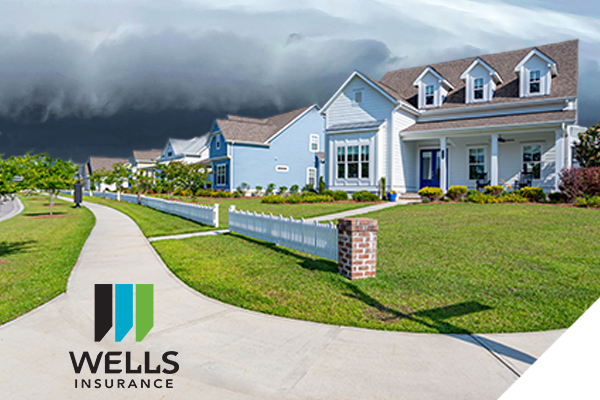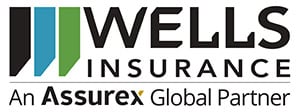Preparing Your Home for a Hurricane

From June through November, hurricanes are at their peak. During a hurricane, heavy rains and catastrophic winds barrel through coastal areas and can severely damage or destroy homes and businesses. To help you plan and remain safe at home during these potentially deadly storms, follow these safety tips.
Prior to Hurricane Season
- Understand your coverage.
- Review your policies with your agent before a storm is on the way.
- Even if your policy is with another agent, Wells will do a no-obligation policy review with you. Bring your policies into one of our offices.
During Hurricane Season
- Plan evacuation routes and designate a “post-disaster contact person” that family members know to call once the storm is over.
- Stock up on items such as bottled water, canned goods, manual can/bottle opener, flashlights, battery-operated radio, nails, tarps and plywood.
- Keep an up-to-date log of all of your possessions with photographs and videos, and review your home insurance policy.
- Trim your trees and shrubs to minimize damage.
When a Hurricane Threatens
- Photograph and take video recordings of the inside and outside of your home. Store that footage in a cloud based service for safe keeping. This will help in the event of a claim to be able to create a home inventory. Alternately, download our FREE Home Inventory Toolkit www.wellsins.com/download-our-free-home-inventory-toolkit
- Have your policy numbers and carrier claims numbers handy, in a place you can access whether you are home or away and if internet access is limited. www.wellsins.com/hurricane-claims
- Cover windows and doors and secure outdoor furniture.
- Make sure you have three gallons of water per family member.
- Refill your prescriptions, fill up your car with gas and withdraw a week’s worth of cash since power outages may interrupt these services temporarily.
- Place important, valuable papers such as your log of possessions in waterproof bags.
- If you live in a trailer home and are told to evacuate, do so immediately.
During a Hurricane
- You should have canned food for at least three days and a can opener.
- Listen to your battery-operated radio for instructions from the local authorities on evacuation and safety guidelines.
- Seek shelter in an interior room away from windows, such as a closet. If you hear the winds subside, do not assume that the storm is over. The calm may be the eye of the storm, in which the worst part is yet to come.
- If the electricity goes out, use a flashlight to see; do not use candles.
After a Hurricane
- Make sure you have pet food and supplies for at least three days.
- When inspecting your home for damage, wear sturdy shoes and clothing as protection.
- Contact a trained expert to turn off damaged utilities and appliances instead of trying to do it yourself.
- Drink only bottled water until tap water is deemed safe.
For individuals in coastal regions, hurricanes and flooding are a potentially devastating risk. However, as hurricanes become frequent and severe, some private insurers may not provide coverage to people located in high-risk areas.
Further complicating matters, hurricanes are a complex exposure that can affect multiple aspects of your property. Homeowners may wrongfully assume their insurance protects them from a severe storm. For that reason, people should assess their coverage and ensure their property is protected in the event of a hurricane.
Potential Losses
Homeowners suffer significant losses as a result of hurricanes every year. In particular, hurricane-related property damage and loss can stem from:
- Wind damage —Hurricane winds can exceed 100 mph and result in extensive property damage.
- Water damage —Rain and storm surges—tidal waves that are pushed toward the shore during a storm—can cause damage to property, automobiles and jeopardize the health and safety of residents.
- Business disruptions —A hurricane’s short- and long-term physical and economic impacts can make it difficult for businesses to resume operations and delay your ability to go back to work.
Research from risk modeling firms suggests hurricanes are increasing in frequency and severity, making it more important than ever for homeowner and property owners to be prepared for the far-reaching effects of these tropical storms.
Hurricane Related Coverage
Hurricanes can cause devastating damage to property, and it’s essential to have adequate insurance coverage before a storm hits (and before a storm is even named). Since hurricanes aren’t generally a named peril in standard insurance policies, property owners will typically need to purchase supplemental insurance policies to cover hurricane damage, including:
- Flood insurance —Flood insurance covers losses directly caused by flooding and can include building and contents coverage.
- Windstorm insurance —Windstorm insurance protects policyholders from property damage caused by gales, winds and hail.
- Sewer backup insurance —Hurricanes can wreak havoc on sewer systems. Sewer backup coverage can protect properties from losses caused by a discharge of water or waterborne material from a sewer, drain or sump.
While most property policies cover debris removal costs, there may be limitations. Property owners should work with a qualified insurance professional to ensure they have coverage for debris removal and pollution cleanup.
Property owners shouldn’t assume their policy includes hurricane coverage. Instead, they should work with their insurance agents to ensure that proper coverage is in place to protect their property in the event of a hurricane. If you have questions regarding hurricane season and how it pertains to your business or commercial insurance, please feel free to reach out us insurance@wellsins.com or 910.762.8551.


